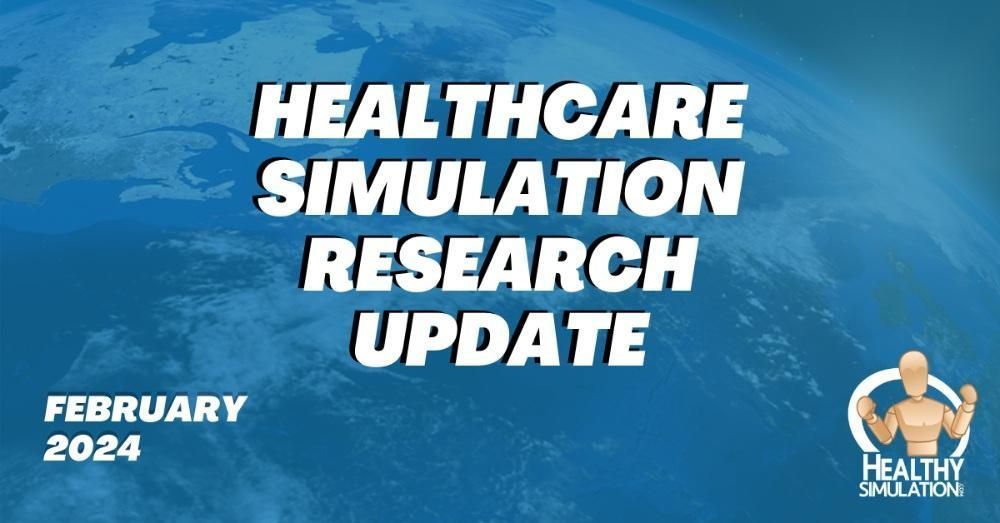The field of healthcare simulation has made tremendous strides forward over the past several decades. One way this revolution is made possible is through clinical simulation research being conducted across the globe. Multiple peer-reviewed journals now focus on clinical simulation research. This HealthySimulation.com article by Content Manager Teresa Gore, PhD, DNP, APRN, FNP-BC, CHSE-A, FSSH, FAAN provides an overview of the latest clinical simulation highlights as of February 2024 and explains how these updates impact the healthcare simulation community overall.
Participate in Research on the Simulation Operations Needs Assessment Tool (SONAT): The Simulation Operations Needs Assessment Tool (SONAT) is in the final phase of reliability testing. The simulation research team has developed a needs assessment tool to assess Simulation Operations Staff’s baseline simulation knowledge and implementation level. The goal is the tool would be beneficial for identifying simulation onboarding needs, professional development opportunities, and encouraging continued growth of the healthcare simulation operations field.
The survey is part of the research study and takes 10-15 minutes to complete. The purpose of the study is to test the reliability of the SONAT and determine if there are any common relationships in the professional development within the Simulatioon Operations community. If you are interested in supporting this research, access and complete the tool at: https://lnkd.in/e66xmaEq
Call for an interprofessional, experiential, performance-based model for health professions education: Medical errors are cited among the leading causes of death in the United States, resulting in devastating consequences for patients and their families, besides adding substantial costs to healthcare. Communication within and between teams is cited as a major contributing factor to patient deaths due to preventable medical errors. Although Universities and Academic Health Centers aim to graduate competent healthcare professionals who are effective healthcare team members, the importance and degree of emphasis given to interprofessional education (IPE) across health professions accreditation organizations is variable. To ensure a highly skilled, efficient and confident health professions workforce, an interprofessional, experiential, performance-based model for health professions education is proposed.
Newborn face mask ventilation training using a standardised intervention and respiratory function monitor: a before and after manikin study: The International Liaison Committee on Resuscitation has recommended improvements in training for neonatal resuscitation, highlighting the potential role of respiratory function monitors (RFMs). Our objective was to determine whether a manikin-based, standardised face mask ventilation training intervention using an RFM with a simple visual display reduced face mask leak. A multicentre, before and after study design was used. Participants (healthcare professionals working or training in hospitals with maternity and neonatal services) and instructors were blinded to the RFM display during both assessment periods.All participants underwent a training intervention on positive pressure ventilation using a modified, leak-free manikin and RFM. The intervention consisted of a demonstration of optimal face mask ventilation technique, training in RFM interpretation with corrective strategies for common scenarios and a period of deliberate practice. Each participant performed 30 s of positive pressure ventilation blinded to the RFM display before and after training.
The results revealed participants (n=412) the median face mask leak before training was 31% compared with 10% after training (p<0.0001). Improvements were noted across all other ventilation parameters. Standardised face mask ventilation training using an RFM with simple visual feedback led to a significant reduction in leak.
Debriefing Methods for Simulation in Healthcare: A Systematic Review: Debriefing is a critical component in most simulation experiences. With the growing number of debriefing concepts, approaches, and tools, simulationists need to understand how to debrief most effectively because there is little empiric evidence to guide us in their use. This systematic review explores the current literature on debriefing in healthcare simulation education to understand the evidence behind practice and clarify gaps in the literature. The PICO question for this review was defined as “In healthcare providers, does the use of one debriefing or feedback intervention, compared to a different debriefing or feedback intervention, improve educational and clinical outcomes in simulation-based education?” A total of 70 studies were included in the final review and found that current debriefing strategies, frameworks, and techniques are not based on robust empirical evidence. Based on this, the authors highlighted future research needs.
Healthcare Simulation Training Guidelines and Literature Reviews From the Third Society for Simulation in Healthcare Research Summit: The Society for Simulation in Healthcare held its third research summit in January 2023 with the aim of establishing evidence-based guidelines for healthcare simulation training. A panel of researchers, clinicians, and subject-matter experts conducted reviews of the literature addressing 12 key topics and followed a formal process to generate 16 guidelines for simulation-based training in healthcare. Eleven peer-reviewed literature reviews accompany these guidelines. Over the last 12 years, the Society for Simulation in Healthcare research summits have evolved with a consistent aim to advance simulation research, culminating in the formal set of guidelines published in this special issue.
View the LEARN CE/CME Platform Webinar How to Conduct Effective Research on Healthcare Simulation-Based Educational Interventions to learn more!
Society for Simulation in Healthcare Guidelines for Simulation Training: Guidelines for optimal methods of simulation training do not currently exist. Systematic reviews of the literature on 16 identified key questions were conducted and expert panel consensus recommendations determined using the Grading of Recommendations Assessment, Development, and Evaluation (GRADE) methodology. These evidence-based guidelines from the Society for Simulation in Healthcare intend to support healthcare professionals in decisions on the most effective methods for simulation training in healthcare
Twenty recommendations on 16 questions were determined using GRADE. Four expert recommendations were also provided. The first evidence-based guidelines for simulation training are provided to guide instructors and learners on the most effective use of simulation in healthcare.
Development of Distance Simulation Educator Guidelines in Healthcare: A Delphi Method Application: This study aimed to disseminate the first set of competencies required of and unique to effective distance simulation educators. This was a multiphasic and iterative modified Delphi study validating the content of carefully and rigorously synthesized literature. Experts were invited from around the globe to participate in this study with mandatory attendance at an annual health care simulation conference to openly discuss the guidelines presented as competencies in this document. We divided each competency into “Basic” and “Advanced” levels, and agreement was sought for these levels individually. The experts provided their opinion by choosing the options of “Keep, Modify, or Delete.” A free-marginal kappa of 0.60 was chosen a priori.
At the conclusion of the Delphi process, the number of competencies changed from 66 to 59, basic subcompetencies from 216 to 196, and advanced subcompetencies from 179 to 182.
This article provides the first set of consensus guidelines to distance simulation educators in health care, and paved the way for further research in distance simulation as a modality.
Enhancing Healthcare Education: Leveraging ChatGPT for Innovative Simulation Scenarios: The purpose of this study was to determine if ChatGPT could create accurate and realistic simulation scenarios efficiently to assist faculty in healthcare education. ChatGPT was used to create five healthcare simulations. The scenarios were sent to 18 peer reviewers who evaluated them using a 25-question Likert scale survey, which also included opportunities to provide qualitative feedback.
Data analysis revealed that scenarios varied in terms of realism regarding patient profile, history, present illness and the way the scenario unfolded. Also noted was that pertinent information was missing in all scenarios however, the information generated was accurate. Most of the reviewer comments were positive and many were surprised at the amount of overall information included in each scenario. ChatGPT is a powerful AI tool that has the potential to help simulation educators develop simulation scenarios. However, at present, caution needs to be employed, considering its current limitations.
More About Medical Simulation Research
Medical Simulation has emerged as a professional field within healthcare education, training, and patient safety. Healthcare Simulation Research Journals have paved the way for academic exploration, understanding, and evolution of the modern day methodology with numerous unique moving parts including: scenario development, debriefing, facilitation, technology, operations, learning theories, and more. Here we list all of the available medical simulation journals and healthcare simulation research publications available from around the world. Those looking for longer reads should check out our Healthcare Simulation Books page!













